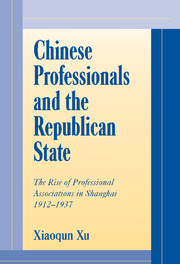 Chinese Professionals and the Republican State
Chinese Professionals and the Republican State Book contents
- Frontmatter
- Contents
- List of Tables
- Acknowledgments
- Abbreviations of Frequently Cited Sources
- Introduction
- Part I Professions and Professionals
- Part II Social Institutions, State Actions, and Professionalization
- Part III Professionalism, Nationalism, and Politics
- 6 From “Literary Men” to Professionals: Shanghai Journalists
- 7 National Essence versus Science: The Medical Profession in Conflict
- 8 Professionalism and Nationalism: The Shanghai Bar Association (I)
- 9 Professionalism and Politics: The Shanghai Bar Association (II)
- Conclusion to Part III
- Conclusion
- Glossary
- Bibliography
- Index
Conclusion to Part III
Published online by Cambridge University Press: 07 September 2009
- Frontmatter
- Contents
- List of Tables
- Acknowledgments
- Abbreviations of Frequently Cited Sources
- Introduction
- Part I Professions and Professionals
- Part II Social Institutions, State Actions, and Professionalization
- Part III Professionalism, Nationalism, and Politics
- 6 From “Literary Men” to Professionals: Shanghai Journalists
- 7 National Essence versus Science: The Medical Profession in Conflict
- 8 Professionalism and Nationalism: The Shanghai Bar Association (I)
- 9 Professionalism and Politics: The Shanghai Bar Association (II)
- Conclusion to Part III
- Conclusion
- Glossary
- Bibliography
- Index
Summary
CHAPTERS 6 through 9 amply demonstrate that under government regulation and even with the GMD party supervision, professional associations were still able to act in the public arena on a wide range of professional, social, and political issues. Professional associations did so in no small part because a political culture of urban elite associations playing a public role had been formed by the Republican era. As government sanction endowed them with publicness, professional associations were among the most legitimate urban associations in a position to challenge state policies and practices.
Professionals also appropriated to their own advantage the political rhetorics issuing from the state. The GMD regulations specified conformity to the Three Principles and party policies as a precondition for the government sanction of any public association. Yet, professional associations (and other public organizations too) could and did always oppose government actions by turning the GMD's provision on its own head, that is, by accusing the GMD's policy of violating the Three Principles and Sun Yat-sen's legacy. All the professional groups examined earlier employed these tactics in their struggles of different kinds.
The assumed publicness not only shielded professional groups from state pressure but also protected their particular group interests. Representing the legal profession, the Shanghai Bar acted to advance lawyers' professional interests while arguing that lawyers' goals were identical with the interests of society at large, such as the realization of the rule of law and judicial independence.
- Type
- Chapter
- Information
- Chinese Professionals and the Republican StateThe Rise of Professional Associations in Shanghai, 1912–1937, pp. 268 - 270Publisher: Cambridge University PressPrint publication year: 2000
